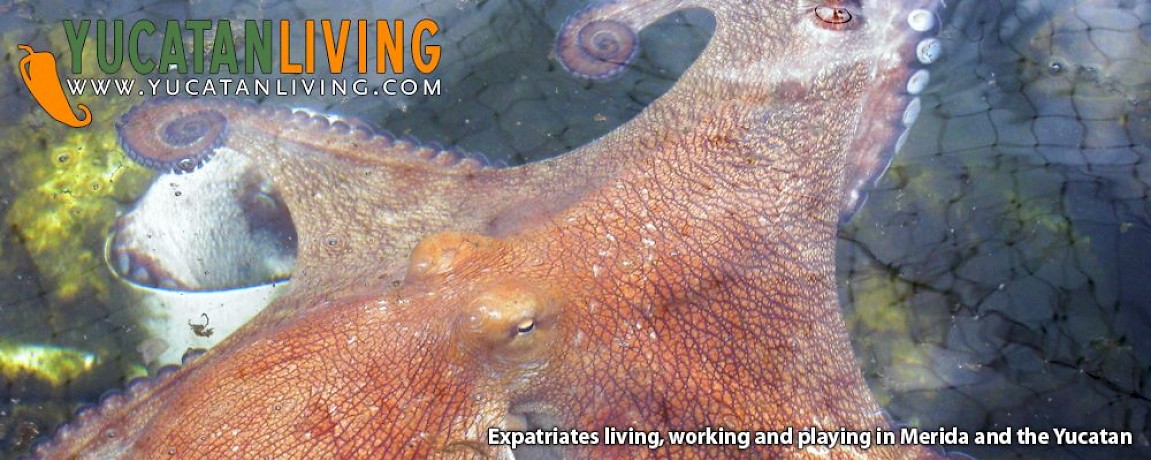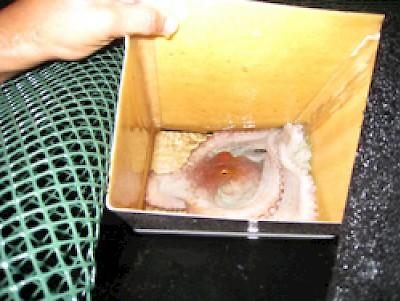Commercial Octopus Farming in Sisal
It’s not quite an octopus’s garden, but researchers at the Sisal campus of Mexico’s national university, working closely with local residents, may be about to establish the world’s first commercial octopus farm.
The Gulf Coast campus of the Universidad Nacional Autónoma de México (UNAM), located in Sisal about 30 miles west of Merida , offers multi-disciplinary programs in coastal management and ocean sciences. Researchers have already scored one first by successfully hatching and raising a local Yucatecan species of octopus in a lab. The challenge now will be to move into larger-scale production.
The key to the breakthrough is the species selected for the experiment: the Mayan octopus, which is unique to the waters offshore of the Yucatan Peninsula and was identified as a separate species only in 1966.
“The reproduction of this species can take place under farming conditions because, unlike other octopus species, the young do not pass through a larval stage,” explained the technician who gave us a recent tour. The research team is led by Professor Carlos Rosas Vazquez of the UNAM science faculty.
The Mayan octopus is also well-suited to cultivation because of its relatively short lifespan of 12 to 18 months. Going hand-in-hand (or maybe tentacle-in-tentacle) with that short growing period, it never reaches an unmanageable size for cultivation. With a mature octopus weighing in at between roughly two to four pounds, there would seem to be little risk of the farmer engaging in a Jules Verne-style struggle with the livestock at round-up time.
And that’s especially good news for the group targeted as the world’s first octopus farmers: the women of Sisal.
The team believes that the local women, who would form a cooperative for the venture, are ideally suited to octopus farming for a couple of reasons. First, most of the men in the community go out to fish. And second, cultivation requires a high degree of manual skill and attention to detail – qualities that Yucatecan women can deliver in spades, as anyone who has admired their hammock-making and embroidery work can attest.
The farming process begins with fertilization, which the male octopus achieves in unique fashion, turning the end of one tentacle into a spoon with which he deposits sperm bundles under the mantle of the female. Under red-shaded artificial light in a large work building, the female then hunkers down in a delivery room that is essentially an open plastic box about a foot square submerged under water. Over a period of several days, she produces thousands of translucent, pale-green eggs that hang from her body in bunches, almost like clusters of miniature grapes. (Their work done for the moment, the males lounge around in large tanks outdoors.)
The next step is to transfer the stalks to washing tanks, where they are carefully hung from artificial netting. Over the next seven weeks, the hatchlings appear, with the complete features of adult octopuses but smaller in size than grains of rice. Shortly after, they graduate to large open tanks in the main part of the work shed.
Here the research has focused on mimicking the octopus’s natural environment. The light level is low, in line with the water depth – up to about 160 feet – at which the species lives in the wild. Strips of green plastic are carefully tied to a wire grid a few inches below the surface to create an artificial seaweed bed. Beneath that, on a sandy bottom, are scattered hundreds of small conch shells in which the octopus hide most of the time, venturing out only to feed.
And it is with the feeding of these young critters that the manual dexterity part of the equation really comes into play.
In a separate food prep area, two local women every day confront a small mountain of opened and divided seashells, each about the size of a fingernail. Onto each half shell – which one of the workers described as the plate for this miniature meal – one of the women doles out a tiny portion of a paste formulated by the research team. The main ingredient is crab, to which is added an array of vitamins and minerals that would give Wonder Bread a run for its money. The paste also contains a solidifier so that after a few hours of refrigeration, the food is thoroughly glued to the shell.
The young octopuses – which, with their round heads and protuberant eyes, elicited cries of ¡Que precioso! from the two female faculty members also touring the facility – are able to chomp down on this chow because of their hard beaks, which in the wild also enable them to enjoy a range of shellfish as the core of their diet. This feature, however, also allows them to chow down on one another, which they do with some frequency, as octopuses are cannibalistic feeders. (It may also be, of course, that their other common name – Mexican four-eyed octopus – has made them unusually touchy and prone to violent outbursts.) Perhaps to focus their adolescent energy into more wholesome pursuits, the team also provides them with live food every day in the form of tiny, shrimp-like creatures.
Having achieved successful cultivation, the team is now anxious to move the activity into the local community. Their hope is to make that happen this year, but barriers in the form of red tape and the need for investment capital still stand in the way.
If their effort succeeds, however, it could bring significant change to the Yucatan fishery.
As regular readers of this site will know, management of the octopus fishery is a constant source of discussion and sometimes friction along the Yucatan coast. The 2009 season, which opened last August, was extremely bountiful: for that, thanks can go to restrictions on octopus fishing in the previous couple of years. Because of the short time it takes for an octopus to reach maturity, stocks were able bounce back quickly in that relatively short period from earlier over-fishing.
In the long term, however, cultivation offers far greater certainty than the vicissitudes of Mother Nature, which often make a joke of the human forecasts on which fishing limitations are based.












Comments
halil ozcurumez 12 years ago
dear sirs,
I would like to FARM OCTOPUS IN ENGLAND. Can you help me to set up my octupus farm.
your early respond will be appriciated
kind regards
halil ozcurumez
Reply
Carlos Gallegos 15 years ago
You mean Octopus doesn't taste like chicken? :-)
Reply
Working Gringos 15 years ago
Just like pulpo!
Reply
Beryl G 15 years ago
Great article. I love the detail. It sounds like a fairly low budget operation that could be started on a small scale by local people. Could UNAM turn a part of the facility into a production area and have Sisal residents operate it? I especially enjoyed reading about octopus sex. Very weird and unrewarding.
Reply
Rico 15 years ago
Sounds great but how do they taste?
Reply
« Back (20 to 25 comments)